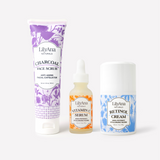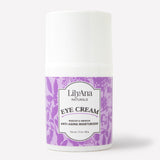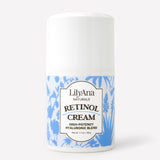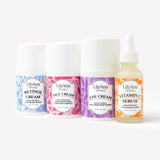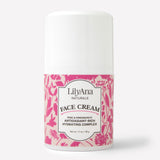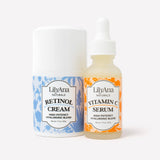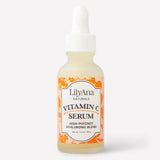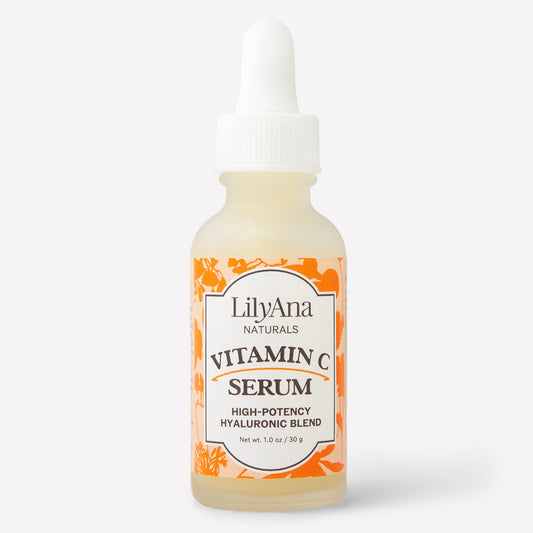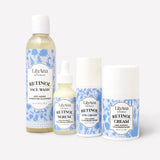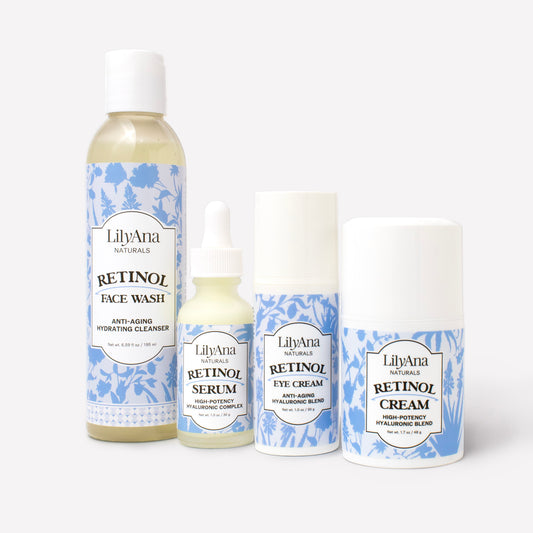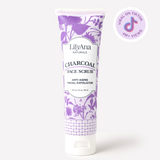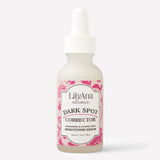We all want the best for our skin, especially when it comes to keeping a glowy, youthful complexion and healthy appearance.
One of the star ingredients running the anti-aging skin care world today is topical vitamin C. With so many vitamin C skincare products on the market, how can you know where to start when adding it to your personal routine?
What is Vitamin C?
Vitamin C is a vitamin that is essential for the human body. It’s responsible for the process of building healthy tissue, repairing collagen, and maintaining brain function.
Unfortunately, the human body cannot produce vitamin C on its own, so we need a little help via supplements. This is why we grew up hearing “eat your fruits and vegetables.” Like other vitamins and minerals, we ideally get our daily dose from eating healthy foods.
L-ascorbic acid, or “ascorbic acid” as it’s seen in ingredient lists, has been used in health and beauty products for decades. Scientifically, the benefits range from improving the immune system to fighting wrinkles, but there’s a reason it’s used in serums specifically intended for the face.

Skin Benefits of Vitamin C
For what it does to the skin, vitamin C is mostly raved about for its antioxidant properties. Or is it loved for its anti-aging properties? Luckily, it’s both.
1. Boosts hydration: Vitamin C, when applied to the skin, helps quench dry skin. It adds hydration to nearly any skin type. It acts as a protective barrier, preventing the loss of moisture throughout the day (or night, if you also like to use it at bedtime).
2. Brightens the skin: Another beauty benefit of vitamin C is that it brightens the skin. It evens skin tone and reduces excess melanin in the skin that can cause hyperpigmentation over time. For best results with brightening, it’s recommended to use a high-quality, non-toxic Vitamin C serum consistently in your skincare routine.
3. Helps restore collagen production: As we age, collagen production in our skin begins to slow down. This is why adding collagen-rich, age-defying skincare products into your daily beauty practice is essential for keeping up with the benefits collagen adds to your body (there are a lot of them!).
Collagen keeps skin, hair, and nails healthy. It’s what helps make skin plump and elastic. Nobody wants sagging skin prematurely, so using the power of vitamin C for collagen healing is a wise beauty move.
4. Fights inflammation caused by free radicals: Free radicals are toxins that react chemically and cause subtle damage to the body. Free radicals can be unavoidable, and they are often found in many things we interact with daily.
Anything from pollution, stress, medication and junk food can cause inflammation in the body, which leads to aging over time. Vitamin C has been scientifically studied for its ability to help neutralize and fight such inflammation in the body. It’s a powerful antioxidant for skin use.
While we shouldn’t expect any single item to be a magical solution to a skin struggle, it’s helpful to know the ways we can reverse the damage. Vitamin C helps specifically fight inflammation related to (you guessed it!) skin and tissue.
Eating plenty of citrus fruits and healthy vegetables can help, but what about applying it directly onto your skin for added benefits? You don’t have to be a rocket scientist to figure that one out.
Why Use Vitamin C Serum?
Now that you know some of the benefits of vitamin C, why should you seek this skin science out in a serum? We believe in today’s world, we need all the nutrient help we can get. Especially if we’re talking about the health of your skin.
Beauty isn’t just skin deep… We’ve all heard the saying before. In this case, it’s true. We could all benefit from striving to live a healthy life that includes diet, exercise, and skincare free of any nasties. Using a vitamin C serum penetrates the skin on a deeper level, giving all the positives of this vitamin directly to the skin instead of waiting to see results from the inside out.
Serums add essential beauty perks in both daily and nightly regimens, with ingredients geared towards giving deeper solutions to individual skin concerns. Use a vitamin C serum after you cleanse your face before using regular moisturizer or sunscreen. It adds that extra layer of active ingredients you want to see work effectively.
How to Use Vitamin C Serum in Your Skincare Routine
Okay, now that we’re a little bit more familiar with the incredible benefits of vitamin C serums, let’s learn the best way to add it to your product lineup. The general rule for any skincare routine is to apply products from thinnest to thickest. Remember to allow a few moments for each product to fully absorb in your skin when caring for your face.
Since vitamin C serum is going to help you brighten, boost collagen, and fight toxins, most women prefer to use it as part of their daytime routine before applying sunscreen. Read on to learn all the dos and don’ts of how to use vitamin C serum properly!
1. Start With A Clean Face
Before you do anything else, you first want to make sure you get your face nice and clean. You don’t want to start applying skincare goodies onto a dirty canvas that might potentially lock in any dirt, germs, or leftover makeup.
Use a gentle cleanser that is best suited for your skin type to wash your face. Avoid contact with your eyes. Rinse thoroughly to reveal your bare, beautiful skin.
2. Apply Your Toner
This step is optional. If you’re the type who uses a toner (smart move, in our opinion!), go ahead and use your toner before any other face serum, oil, or lotion. Toners help remove any excess dirt before applying serums or other facial care products.
After using a toner, your pores will be more open to better absorb the goodness of a serum. Make sure you have a brand with pure ingredients for the next step because it’ll drastically change your skin for the better.
3. Grab Your Vitamin C Serum (But Not Too Much!)
Now we get to the important part: applying the vitamin C serum to your skin. Your face is clean, shiny, toned, and ready for some love. You’re excited to see those benefits of vitamin C go straight to your face! But hold on, don’t douse your face with a flood of serum.
Remember, a little bit goes a long way when it comes to serum, as it’s intended to directly give you great active ingredients and set a healthy base for moisturizing products in the next step. Plus, you just spent money on this valuable serum. Enjoy it, but don’t let it go to waste by using a huge amount. This isn't a hair conditioner.
4. Apply Your Serum Like an Expert
Drop a small, coin-sized amount of vitamin C serum into the palm of your hand. Rub gently between your palms or fingerprints to slightly activate and warm the serum. Then, apply one thin layer all over the face, neck, and décolleté.
5. Allow the Serum to Soak In Fully
Be sure to allow the serum several moments to fully dry before applying your next product. This will let the serum soak all the way in and work its magic into your skin.
6. Follow Up With Moisturizer
After you’re all serum’d up, it’s recommended that you follow up with a moisturizing oil or face cream. This will help seal in all the goodness from the vitamin C serum and ensure your face stays hydrated and smooth.
You can absolutely use vitamin C serum in your morning routine before you put on your makeup. It’s safe to use all-natural vitamin C serum underneath makeup throughout the day, as it will still give you all the benefits you need.
7. If It’s Daytime, Don’t Forget Your Sunscreen
If you’re using your vitamin C serum in the morning or daytime, great! Many people prefer this, as it’s protective and safe for daytime use. Be sure to use an SPF sunscreen if you’ll be in contact with the sun, as we all know sun damage will counteract the anti-aging benefits you’re looking for with vitamin C.
Properly Storing Your Vitamin C Serum
When storing, avoid exposing the product to light and air. Vitamin C in a liquid or serum form is known to be an unstable ingredient. This means it can be prone to going bad if not stored properly.
Keep it in your medicine cabinet, makeup bag, or makeup drawer. Make sure it’s in an air-tight container. Avoid leaving it out on a sunny bathroom counter, unless it’s in light-safe packaging.
When To Use Your Vitamin C Serum
Feel free to use your vitamin C products daily. Some women like to use it for their evening skincare, but we mostly see it preferred for daytime use. It’s also safe to use both day and night if you want.
Remember to use vitamin C before your other daily products. For best results, follow up the serum with other products that contain vitamin C in the ingredients, like a moisturizer, eye cream, or sunscreen.
Who Should Use Vitamin C Serum?
Anyone who wants a little help maintaining a healthy glow, fighting aging, and decreasing dark spots, sun damage, fine lines, and wrinkles should start using vitamin C serum. Young adults can start using vitamin C as a protective and preventive habit.
There’s nothing wrong with starting awesome skincare habits early! Individuals in their late 20’s, 30’s or beyond can still benefit from starting to use vitamin C serums. It’s not too late to get the extra help you need for supple skin and anti-aging powers.
Is Vitamin C Safe for Everyone?
Vitamin C, in its purest form and in common skincare derivative, is generally safe for someone of any skin type to use daily. Some people with severely sensitive skin might experience mild reactions to any new product, including a vitamin C product.
If you have a history of sensitive skin, be sure to check in with your dermatologist before using new products with ingredients you are unsure about. People with sensitive skin may want to avoid using skincare lines with pure vitamin C (L-ascorbic acid), as it is a type of acid and can sometimes be rather harsh.
Fortunately, other forms of vitamin C can be gentler and help prevent any yucky reactions.
Different Forms of Vitamin C in Skincare
It’s helpful to note that not all forms of vitamin C are created equally. As we’ve learned already, the pure form of vitamin C is called L-ascorbic acid, or ascorbic acid. You can find many safe, quality skincare products that contain the ideal amount (at least 10% of the ingredients) of vitamin C in this form.
But other formulations contain vitamin C that can still be just as effective, even if the ingredients don’t contain vitamin C’s purest form. Other forms of vitamin C that show up in skincare ingredients lists include:
- Sodium ascorbyl phosphate
- Magnesium ascorbyl phosphate
- Ascorbyl palmitate
- Tetrahexyldecyl ascorbate
- Retinyl ascorbate
What Type of Vitamin C Does LilyAna Naturals Use?
In our vitamin C serums, we use an all-natural form of vitamin C that helps the skin, called sodium ascorbyl phosphate. As it’s technically a salt, it’s much less harsh than straight ascorbic acid. It’s also generally more stable when it comes to shelf life, meaning you’ll be able to keep using your serum without worrying about it expiring too early.
Sodium ascorbyl phosphate is rated by EWG (The Environmental Working Group) as a rating of one. On their scale of 1-10 (ten being the most risk of toxicity), one is the safest rank to get for both safety and environmental friendliness.
Benefits of sodium ascorbyl phosphate include:
- More stable than pure vitamin C (longer shelf life)
- Gentler on the skin so a wider variety of people can use the product, like people sensitive to pure vitamin C or other acids
- Also works well with vitamin E and other moisturizing agents
- All the same benefits of L-ascorbic acid, except lighter
- Increasingly effective over time

How To Get the Most Out of Vitamin C Serums
Finding a trusted source of vitamin C for your skin can be confusing! We know. With so many products out there, learning how to read the ingredients is key these days. The more you know about what to look for, the better you’ll be able to get the most out of your vitamin C serum.
1. Read the Ingredients
If you can understand the ingredients list, you can make better, more informed decisions on which products to use for keeping your skin healthy and young. Aim for serums that are about 10% vitamin C.
2. Avoid Vitamin C and Retinol at the Same Time
For some women, combining vitamin C with retinol can cause irritation. Using both ingredients at the same time can also prevent proper absorption of vitamin C, so if you use retinol and vitamin C, try using them at different times. Many women will use vitamin C in the day and then apply retinol in the evening.
3. Don’t Mix With Benzoyl Peroxide
Another ingredient to avoid with vitamin C serum is something called benzoyl peroxide, an ingredient found in many acne treatment products. If you need to use something with benzoyl peroxide, try alternating products but don’t use them together. Ask a skin expert if you have any questions about which products are okay to use while adding vitamin C serum regularly.
4. Use It Regularly
Consistency is queen. Using vitamin C serum regularly is smart for your skin. The more you use it, the more you’ll see results that last.
5. Wear It During the Day
Because vitamin C serum is loved for its brightening effects, using it during the day is an excellent way to enhance your beauty while getting the benefits you want underneath. It’s safe to use under sunscreen, too, so you might as well combine both sun-shielding powers into one.
5. Use It With Other Vitamin C Products
To get even further ahead in the skincare game, use your vitamin C serum as part of a full C-powered product line. This way, your skin is getting the extra vitamin love it needs to stay healthy, glowing, and self-loving in more than one product.
If you need help choosing your next best skincare friend, check out LilyAna Naturals’ line of vitamin C serums and vitamin C collections. We strive to help women get the all-natural, “no nasties” facial products in their daily routine, for the love of health, beauty, and the planet.
